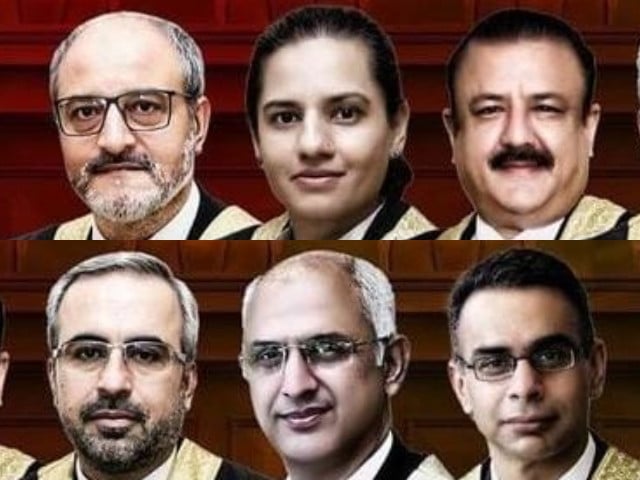
Senior lawyer Chaudhry Aitzaz Ahsan and the Lahore High Court Bar Association (LHCBA) on Tuesday moved the Supreme Court seeking its own investigation into the letter penned by six Islamabad High Court judges, alleging undue influence by intelligence agencies in judicial matters.
Ahsan urged the apex court to establish a three-member commission comprising sitting judges of the SC "to determine the officers and operatives of the ISI [Inter-Services Intelligence] or other persons, if any, are or were involved in such unlawful acts and to report its finding to this [Supreme] Court”.
He sought directives for the federal government to dismiss individuals implicated in “unlawful acts”, with no entitlement to retirement or other benefits from the national treasury.
For those who have already retired, he sought the cessation of any pensions or associated benefits.
Ahsan urged the federal government to enact necessary regulations to fulfil the clauses of the petition.
His petition referred to Article 184(3) of the Constitution to question the matter of public importance in the six IHC judges letter case.
"Without prejudice to the provisions of Article 199, the Supreme Court shall if it considers that a question of public importance concerning the enforcement of any of the Fundamental Rights conferred by Chapter 1 of Part II is involved, have the power to make an order of the nature mentioned in the said Article," the petition read.
Referring to 184(3), the petition contended to investigate whether judges at different levels of the judiciary, including high courts and district courts, were being influenced by the ISI or the executive, as indicated in the judges' letter.
It also contended to investigate whether or not there was an ongoing strategy within the executive, facilitated by intelligence agencies, to intimidate sitting judges.
Lastly, it questioned the existence of legal guidelines defining the ISI's jurisdiction and accountability.
Ahsan asked the court to issue directions to the federal government to ensure that the prime minister, the chief of army staff (COAS), and the director general of the ISI issued immediate written directives to all personnel under their authority, instructing them to disregard any orders, whether verbal or written, that sought to interfere with the ongoing judicial proceedings or influence judges.
Read PTI demands full court on judges’ letter
He added in his plea that the court should warn them of the consequences of failing to do so.
Ahsan further sought for these directives to be made public by being published on the official websites of the government.
In its petition, the LHCBA urged the SC to commence an inquiry into the concerns raised in the letter penned by the six IHC judges.
The LHCBA sought the direct holding of a judicial inquiry by the SC judges into the allegations contained in the letter of IHC jurists.
The bar’s petition called for imposing stringent penalties on the individuals proven guilty of attempting to intimidate, influence, or interfere with the functioning of the judiciary in any capacity.
The petition referred to Article 209 of the Constitution, noting it empowered the Supreme Judicial Council (SJC) with “vast” authority to “provide protection to judges and to look into the complaints and make recommendation for proceedings including to the Supreme Court concerning the independence of the judiciary”.
"Lack of trust in public institutions engenders autocracy and threatens democracy," the petition read.
The petition further stated that the issue highlighted in the letter from the judges of IHC concerned a fundamental constitutional principle -- the independence of judiciary.
It quoted that this principle had been recognised as a cornerstone of the Constitution, as established in one of the SC’s own rulings.
On March 30, following a consultation with Chief Justice of Pakistan Qazi Faez Isa and other senior apex court members after the letter was written, the federal government appointed former top judge Tassaduq Hussain Jillani as the chief of an inquiry commission tasked with probing allegations that the county’s intelligence agencies are meddling in the affairs of the IHC.
However, a day earlier, Jillani recused himself from heading the inquiry body.
In response to Tassaduq's recession, the SC took suo motu notice of the letter written by the IHC judges.


















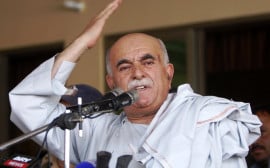






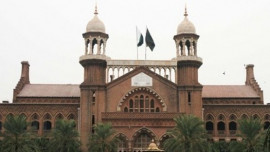

1715843823-0/WhatsApp-Image-2024-05-16-at-12-14-16-(1)1715843823-0-270x192.webp)

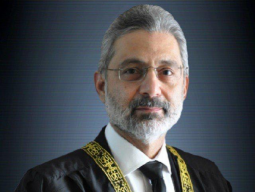
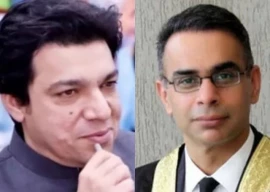






COMMENTS
Comments are moderated and generally will be posted if they are on-topic and not abusive.
For more information, please see our Comments FAQ